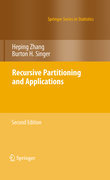
The routes to many important outcomes including diseases and ultimately deathas well as financial credit consist of multiple complex pathways containing interrelated events and conditions. We have historically lacked effective methodologies for identifying these pathways and their non-linear and interacting features. This book focuses on recursive partitioning strategies as a response to the challenge of pathway characterization. A highlight of the second edition is the many worked examples, most of them from epidemiology, bioinformatics,molecular genetics, physiology, social demography, banking, and marketing. The statistical issues, conceptual and computational, are not only treated in detail in the context of important scientific questions, but also an array of substantively-driven judgments are explicitly integrated in the presentation of examples. Going considerably beyond the standard treatments of recursive partitioning that focus on pathway representations via single trees, this second edition has entirely new material devoted to forests from predictive and interpretive perspectives. For contexts where identification of factors contributing to outcomes is a central issue, both random and deterministic forest generation methods are introduced via examples in genetics and epidemiology. The trees in deterministic forests are reproducible and more easily interpretable than the components of random forests. Also new in the second edition is an extensive treatment of survival forests and post-market evaluation of treatment effectiveness. " "Integrates conceptual and computational treatment of tree representations of complex pathways to important outcomes across diverse scientific applications Introduces random and alternative deterministic forests to facilitate interpretability of pathways with many contributing conditions and non-linear relationships Illustrates the interplay between scientific judgments and constraints on allowed pathway constructions; comparisons with conventional statistical methods INDICE: Introduction.- A Practical Guide to Tree Construction.- Logistic Regression.- Classification Trees for a Binary Response.- Examples Using Tree-Based Analysis.- Random and Deterministic Forests.- Analysis of Censored Data: Examples.- Analysis of Censored Data: Concepts and Classical Methods.- Analysis of Censored Data: Survival Trees and Random Forests.- Regression Trees and Adaptive Splines for a Continuous Response.- Analysis of Longitudinal Data.- Analysis of Multiple Discrete Responses.
- ISBN: 978-1-4419-6823-4
- Editorial: Springer
- Encuadernacion: Cartoné
- Páginas: 256
- Fecha Publicación: 29/07/2010
- Nº Volúmenes: 1
- Idioma: Inglés
